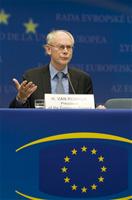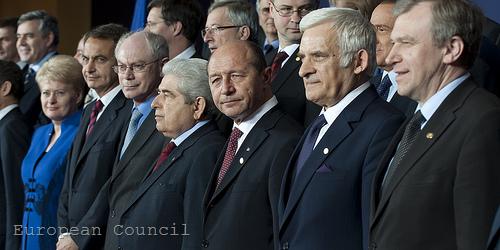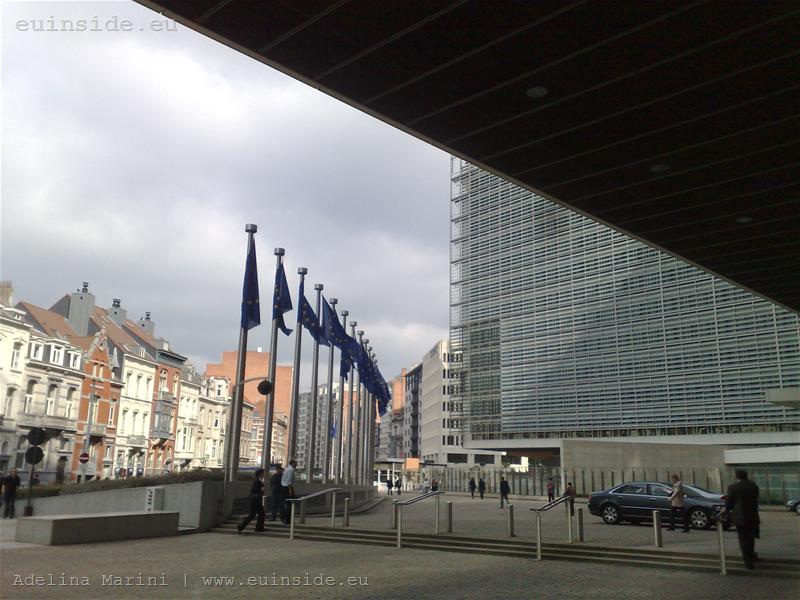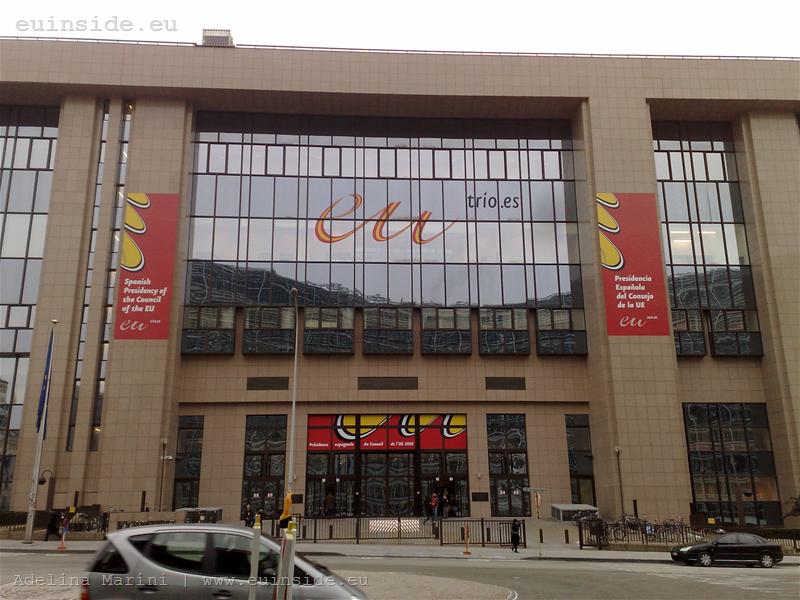Europe 2020 or a second EU attempt to become the most competitive economy in the world
Ralitsa Kovacheva, February 14, 2010
 EU leaders had to focus all their efforts and time on Thursday discussing the new strategy Europe 2020 which will replace the Lisbon Strategy for Growth and Jobs. In fact, this is the economic plan of the Union for the next 10 years of its development and shows the focus of member states on a Community level to make it more competitive on the global market. In fact, one of the goals of the Lisbon Strategy was exactly this - to make European economy the most competitive in the world by 2010. As it is probably clear, this has not happened yet. But because of the crisis in the euro area, caused by Greece, EU leaders managed only to get acquainted with the basics of Europe 2020.
EU leaders had to focus all their efforts and time on Thursday discussing the new strategy Europe 2020 which will replace the Lisbon Strategy for Growth and Jobs. In fact, this is the economic plan of the Union for the next 10 years of its development and shows the focus of member states on a Community level to make it more competitive on the global market. In fact, one of the goals of the Lisbon Strategy was exactly this - to make European economy the most competitive in the world by 2010. As it is probably clear, this has not happened yet. But because of the crisis in the euro area, caused by Greece, EU leaders managed only to get acquainted with the basics of Europe 2020.
The initial discussion of the strategy Europe 2020 officially ended in the beginning of this year. More than 1,500 proposals have been made by different interested sides: member states, regions, business and professional associations. In general, the strategy and its priorities are approved with the recommendation to avoid the mistakes from the Lisbon Strategy and the new one to be more specific and strictly implemented.
In general, there is broad support among member states for the thematic priorities: growth from knowledge, inclusive societies and a greener, competitive economy. In the current context of an economic crisis member states stress the importance of keeping the focus of Europe 2020 to remain the same as in the Lisbon Strategy - on growth and jobs. Some countries insist on larger social commitments. Unlike the Lisbon Strategy there is a broad consensus that Europe 2020 should be better bound to other EU strategies like the one for sustainable development, cohesion and social policy, policies in the area of energy and climate.
Member states are unanimous that governance should improve so as to avoid discrepancies  between commitments and real actions which happens quite often still. According to many nations, deterioration of public finances due to the crisis is of key significance. This is why the need of investments in (new) sources of growth would be the spine of fiscal consolidation in the years to come. According to many members, more attention in the new strategy is needed for production and for the small and medium business as creators of growth and jobs, as well as the strengthening of the single market, the macro economic stability and stimulating internal demand. Many of the countries agree with the idea of a limited number European goals, translated into national. In general, there is a string support for the European Council to have a leading role, as foreseen in the new strategy - something of which the European president Herman van Rompuy spoke on Thursday as well.
between commitments and real actions which happens quite often still. According to many nations, deterioration of public finances due to the crisis is of key significance. This is why the need of investments in (new) sources of growth would be the spine of fiscal consolidation in the years to come. According to many members, more attention in the new strategy is needed for production and for the small and medium business as creators of growth and jobs, as well as the strengthening of the single market, the macro economic stability and stimulating internal demand. Many of the countries agree with the idea of a limited number European goals, translated into national. In general, there is a string support for the European Council to have a leading role, as foreseen in the new strategy - something of which the European president Herman van Rompuy spoke on Thursday as well.
What are the positions of the different players so far?
The European political parties
 Socialists and democrats propose 5 priorities: a new deal for sustainability; high quality full employment with decent work and social inclusion; fight against poverty, inequality and insecurity; a high-productivity knowledge-based economy; social & territorial cohesion. Regarding governance, the socialists and the democrats do not agree the European Council to get central role but rather the portfolio Councils, the European Parliament and national parliaments to be better included in governance as well as social partners and the regions.
Socialists and democrats propose 5 priorities: a new deal for sustainability; high quality full employment with decent work and social inclusion; fight against poverty, inequality and insecurity; a high-productivity knowledge-based economy; social & territorial cohesion. Regarding governance, the socialists and the democrats do not agree the European Council to get central role but rather the portfolio Councils, the European Parliament and national parliaments to be better included in governance as well as social partners and the regions.
 The liberals however agree with the main priorities (green and smart), but they call for more focus on internal market, free movement of people and financial supervision. According to them, central role in the governance of the Union should be given to the European Commission which should use the stick & carrot method to encourage well performing countries with additional structural funds and to impose financial sanctions on those who do not spend European money, according to the Europe 2020 priorities. The Commission should take decisions about the indicators and the convergence criteria, for avoiding social dumping or mining of competitiveness of member states, the liberals say.
The liberals however agree with the main priorities (green and smart), but they call for more focus on internal market, free movement of people and financial supervision. According to them, central role in the governance of the Union should be given to the European Commission which should use the stick & carrot method to encourage well performing countries with additional structural funds and to impose financial sanctions on those who do not spend European money, according to the Europe 2020 priorities. The Commission should take decisions about the indicators and the convergence criteria, for avoiding social dumping or mining of competitiveness of member states, the liberals say.

 for small and medium enterprises and the legislation, related to climate and energy, to become a priority for the Union.
for small and medium enterprises and the legislation, related to climate and energy, to become a priority for the Union.
Regions and local authorities
understandably, concentrated on increasing their participation in governance. 120 European regions took part in the discussion, representing 2/3 of member states. They say their role should be increased so as to secure full and equal partnership among different levels of governance. In this regard, the new strategy should be implemented hand in hand with cohesion policy and its instruments.
European bodies and institutions
Eurosystem (the management board of the eurozone) has approved the integration of social and environment goals in the strategy as, in the meantime, insist on keeping focus on growth and jobs. Special attention should be paid to the good functioning of the labour market, the policies of the internal market, competitiveness and innovation, as well as the tight implementation of the Stability and Growth Pact.
According to the European Centre for Development and Vocational Training Europe 2020 strategy should include detailed policies regarding innovation and creativity, vocational training and qualification in particular, including professional qualification. Partnership between business and researchers should help skills development to better match the requirements of business.
Partners
Social partners share the opinion that more efforts should be invested in education and qualification. Business insists on removing barriers in the internal market and on a continued reduction of red tape.
Consumer organisations focus on social inclusion and consumer rights. They underline the importance of securing legal protection for online commerce and for e-commerce in general.
Third countries like Japan and Norway expressed their support for the strategy, by explicitly stressing on free trade. According to the IMF the new strategy should target the creation of better as possible conditions for the markets in support of employment and productivity as well as focusing on reforms of labour market. The UN welcomed the global dimensions of the strategy and the American Trade Chamber proposed another two priorities to be added: deepening of the common market while in the same time keeping the EU open.
The citizens
also had the opportunity to comment on the new EU strategy. Some 500 people from almost all member states took part in the discussion, Most Europeans say that education, research and the knowledge-based society are of utmost importance for the future of the Union. Citizens support the serious intentions for tackling climate change and for environment protection.
Now what's left is heads of state and government to finally agree on how Europe 2020 should look like. This will happen on their regular informal summit in March and the final decision to adopt the document is expected to happen in the end of the Spanish Presidency - the end of June. In his statement at the informal EU summit on Thursday the president of the Commission Jose Manuel Barroso said that the lessons from the crisis create an urgent need for increasing of coordination within Europe. The interdependence, especially in the euro area, requires serious reforms in some states. But these reforms should be implemented, again, in coordination with all the rest. In other words, no country should face the new challenges alone.
Something more - Barroso says that the time has come for the EU to turn its view outside and take a leading role in the G20 which is a European initiative, he recalled. And the European president Herman van Rompuy announced that part of the reasons for the global crisis was the lack of long-term vision and a programme for development, This is why the new strategy Europe 2020 was so important, he added.
 | © European Council
| © European Council  | © euinside
| © euinside | © euinside
| © euinside | © euinside
| © euinside